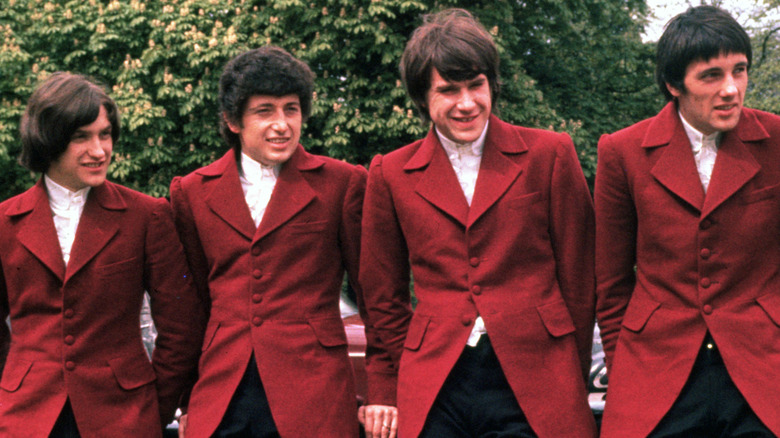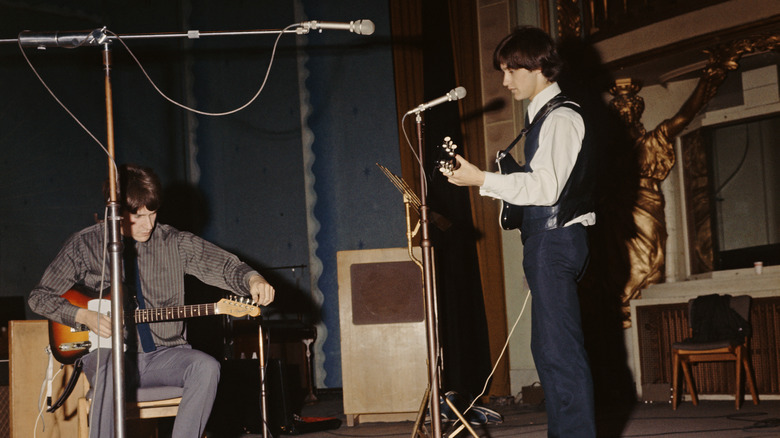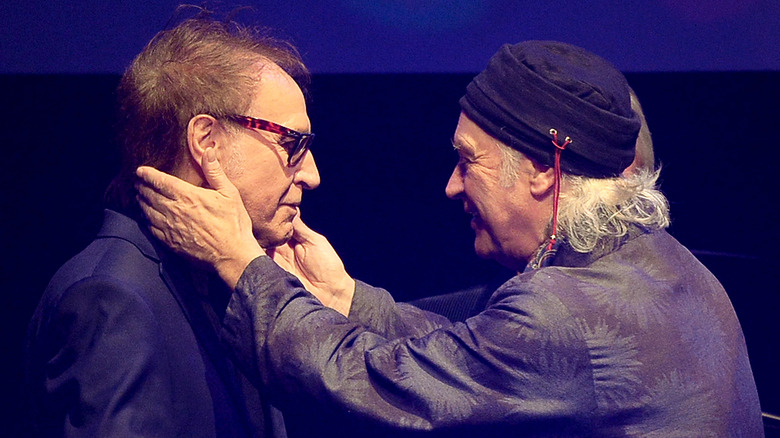The Real Reasons The Kinks Broke Up
Following in the footsteps of the Beatles and the Rolling Stones, the Kinks were one of many acts from England that made their way to the United States in the 1960s. And like their predecessors, the band's influence can be felt even today. According to Britannica, the band's third single, "You Really Got Me" was more than their long-awaited big break. The song, along with the Rolling Stones to this point, helped explode the popularity of white musicians playing rhythm and blues. Outside of this, the song also became a foundation for both American punk and heavy metal genres. The song would just be the beginning, as the band would continue to create amazing music for the next three decades.
Unfortunately, like the Beatles and the Stones, the Kinks were riffed with infighting between their two lead members. Generations before Liam and Noel Gallagher's explosive rivalry launched and plummeted Oasis, the brothers Ray Davies (above, third from the left) and Dave Davies (far left) led the Kinks to the top of the rock world, only to fall off fighting each other. As told by Ultimate Classic Rock, the brothers were the seventh and eighth children in a household of girls (Ray being the older one) and struggled to get attention in the large family. At the same time, the brothers connected with music, while also constantly being at each other's throats.
The Kinks' anger issues affected their marketability
While the "bad boy" archetype is well-known and celebrated among rock fans, it is not celebrated among the higher-ups in the music industry. According to Britannica, the band self-sabotaged their chances to match the success of the Beatles and the Rolling Stones during their 1965 United States tour. During one performance, Dave Davies was knocked unconscious by the group's drummer, Mick Avory, Ultimate Classic Rock reports. In his autobiography, "X-Ray" (quoted by the BBC), Ray Davies remembered a fight between the band and a producer on Dick Clark's "Where The Action Is," after the producer accused the group of being late (via BBC).
By the end of the tour, the Kinks had affected their careers forever. The American Federation of Music refused to give the English group work permits for the next four years, keeping them from being able to tour the States. Ray Davies said, "It was a terrible blow for our careers. We couldn't tour, we couldn't play Woodstock ... I was really hurt because America was the inspiration for our kind of music."
During this time, the Kinks began to hit their stride musically. After being banned from the U.S., Ray, the group's songwriter, began to expand his songwriting to focus more on English daily life. At the same time, though, he continued to struggle with the rivalry he had with his brother.
Ray and Dave Davies' rivalry
Speaking to the Biography Channel (quoted by Ultimate Classic Rock), the group's producer Shel Talmy recalled having to leave the Davies brothers alone when they would fight in the studio. "I'd call a coffee break, the rest of us would go and have a cigarette, and when they were done we'd come back and start over."
According to Britannica, Ray and Dave Davies remain the only original members of the Kinks from their beginning to their breakup more than three decades later. During this time, the brothers saw many highs and lows, both in their music and in their personal lives. Ray Davies suffered a nervous breakdown in 1966 and attempted suicide in 1972 after his wife left him. Before the Kinks, a 15-year-old Dave Davies impregnated his girlfriend, leading to the two families separating the couple. Dave would not see his child until she was in her 30s.
Despite these struggles, the band soldiered on with the two brothers leading the way. At least, until 1996 when, as told by the Independent, the band finally broke up when the two brothers could no longer work with each other. While their music legacy had been cemented with a 1990 induction into the Rock and Roll Hall of Fame, fans celebrated in 2019 when Dave Davies told Rolling Stone he and his brother were working on new material.


